Creation Care

It was not so long ago that the cobblestones of Paris were red with blood. November 2015: terrorism. 1940: WWII. 1914: WWI. 1871: Prussians (post Napoleon). 1789: Revolution. One could keep going: 1479 – Joan of Arc.
With such a history in mind, and with politicians screaming “crusades” not so far away, it is no small thing to witness thousands upon thousands of people gathered to sit at tables with laptops and coffee and microphones and to talk to one another, countries who have warred with one another and taken one another’s trees and lakes and minerals. Here are 190 countries – not counting the many indigenous nations still unrecognized but many of which are still present.
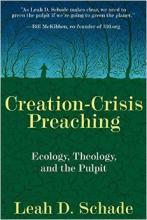
PREACHING A SERMON on an issue debated in the public square: It’s complicated. Make that issue the climate crisis, and it’s really, really complicated. Even in congregations where climate change is not broadly disputed, a pastor faces the challenge of crafting a gospel-informed message that doesn’t swing either to naïve ways we might “make it all better” or pessimistic apathy.
But there’s evidence it’s worth the work and risks: In terms of policy issues, climate is one where a clergy leader’s word has proven impact. According to a 2014 survey by the Public Religion Research Institute and the American Academy of Religion, Americans with a clergy leader who “speaks at least occasionally about climate change” are more likely to be concerned about the issue than those “who attend congregations where the issue is rarely or never raised.”
So where does a preacher begin and with what goals?
Leah D. Schade’s Creation-Crisis Preaching equips pastors to name the present crisis and preach a call to action and healing. She describes one theological path to sermons infused with both testimony of the sacredness of God’s creation and our call to be agents of the world’s healing. Schade is a Lutheran pastor and anti-fracking activist who has also done doctoral work focused on homiletics and ecological theology. Appropriately, in this book she explores both the theoretical underpinnings and the practicalities of climate-crisis preaching. Her approach is clear-eyed about the current dire situation of creation, but also committed to hope: “Because I am a Lutheran homiletician,” she writes, “I am compelled to find a way to preach the eco-resurrection, even when most signs indicate that Good Friday may be the fate of our planet.”
Schade sketches the sometimes contentious and damaging history of religion’s relationship to the environment, some different approaches to ecological theology, and a “‘green’ hermeneutic for interpreting scripture.” She explores briefly how social change theory can inform the vocation of preaching and the role sermons might play in a social movement.
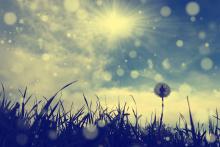
At COP21 last week, religious leaders participated in a “Fast for Climate” and delivered petitions with more than 1.7 million signatures to Christiana Figueres, executive secretary of the UN Framework Convention on Climate Change, demanding immediate climate action.
These leaders, from different faith traditions, also held a press conference at COP21 with the message that they are united in the fight against climate change.
COP21 is not only a gathering of world leaders to achieve an agreement on climate change — it is a gathering for all concerned with the issue. This has included religious leaders from many of the world’s faiths and denominations, who realize a responsibility to speak out on grave societal illnesses and care for the world.
One of the most intriguing and lifegiving events at COP21 was an ecumenical worship service held at the Notre Dame Cathedral on Dec. 3, organized by the Council of Christian Churches in France.
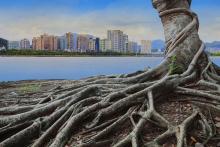
WHEN WE CONSIDER the crisis of climate change, many of us swing back and forth between a narrative of despair in which “there is nothing we can do” and a narrative of hope that affirms that good futures are available when we act responsibly. Surely Laudato Si’, the encyclical released by Pope Francis last spring, has given enormous impetus to the narrative of possibility, summoning us to act intentionally and systemically about climate change.
The issue of climate change is a recent one, but the matter of revivifying the creation is a very old one in faith. In ancient Israel, as now, care for creation required a vision of an alternative economy grounded in fidelity.
The economy of ancient Israel, a small economy, was controlled and administered by the socio-political elites in the capital cities of Samaria in the north and Jerusalem in the south. Those elites clustered around the king and included the priests, the scribes, the tax collectors, and no doubt other powerful people. Those urban elites extracted wealth from the small, at-risk peasant-farmers who at best lived a precarious subsistence life. The process of extraction included taxation and high interest rates on loans. These were financial arrangements that drove many of the peasants into hopeless debt so that they were rendered helpless in the economy.
While that arrangement was exploitative, it no doubt appeared, at least from an urban perspective, to be normal, because the surplus wealth and the high standard of living it made possible seemed natural and guaranteed. The power people who operated the economy could assume surplus wealth, and the exploited peasants were impotent in the face of that power. The arrangement appeared to be safe to perpetuity.
Speeches of judgment
Except that a strange thing happened in ancient Israel in the eighth century B.C.E. (750-700 B.C.E.). There appeared in Israel, inexplicably, a series of unconnected, uncredentialed poets who by their imaginative utterance disrupted that seemingly secure economic arrangement. We characteristically list in that period of Israelite history four prophets—Amos, Hosea, Isaiah, and Micah. They came from various backgrounds, but they shared a common passion and a stylized mode of evocative speech.
The “normative” economy of the period had assumed that the economy consisted of only two participants: 1) the productive peasants, and 2) the urban elites, who did not work or produce anything but who lived well off of peasant produce. Those uncredentialed poets, however, dared to imagine and to utter that there was, inescapably, a third participant in the political economy: namely, the emancipatory God of the Exodus.

The French government has banned mass gatherings during COP21 in Paris. So protesters have gotten creative.
The organization Brandalism has posted 600 pieces of artwork and fake advertisements all over the city that mimic real advertisements but actually denounce politicians and corporations for their apathy toward climate change.
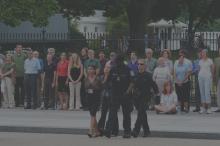
They said it was a fool’s errand.
They said there was too much money on the other side.
They said the politics were too difficult.
And yet here we are.
As my friend Bill McKibben wrote in 2011, our indigenous brothers and sisters in Canada had been fighting the Keystone XL pipeline for years. But before August 2011, virtually no one in the U.S. had even heard of it.
Then I read the pastoral letter from Alberta’s Bishop Luc Bouchard, The Integrity of Creation and the Athabasca Oil Sands, and I felt the Spirit calling me to action.
We put out a call to religious leaders to join the Tar Sands Blockade in Washington, D.C., in the summer of 2011. It was hot. It was humid. It was summer in D.C. But hundreds and hundreds of Protestant pastors, rabbis, Buddhist priests, Franciscans, Unitarians, and Christians of all stripes said they would come.

Religious historian Diana Butler Bass is our preeminent narrator of the decline of traditional religion and the emergence of progressive and spiritual-but-not-religious faith in the 21stcentury.

The first thing the new Pope Francis said to the world in St. Peter's Square when he accepted the papacy was "I am a sinner." In a final mass of one million people in Philadelphia, the last words Francis spoke to the American people were, "Please pray for me; don't forget!"

WASHINGTON, Sept. 29, 2015 -- Pope Francis' visit to the U.S. sparked inspiration and action among hundreds of Christian, Muslim, Jewish and other national religious leaders at the 2-day interfaith Coming Together in Faith on Climate gathering September 24 and 25 at Washington National Cathedral. The events celebrated the Pope's leadership on climate change, and top leaders pledged to make an impact in their houses of worship and inspire their congregations and communities to care for creation.
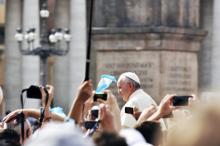
As one human family, it’s time to raise our moral voices.
As Pope Francis has illustrated, true faith is not a disengagement from the challenges of the world but an embrace of those very challenges.
The truth is there is no gospel that is not social; no gospel that relieves us of our call to love our neighbors as ourselves; no gospel that lives outside God’s admonition to serve the least of these. Pope Francis has made this clear, and for that we thank him.
In the history of the United States, a moral critique has always been at the center of any challenge to the structural sins of society—slavery, the denial of women’s rights, the denial of labor rights, the denial of equal protection under the law, the denial of voting rights, and the promulgation of unchecked militarism. We have never overcome any of these evils without a moral critique that challenged their grip on the heart and imagination of our society.
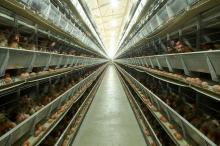
Barrett Duke didn’t grow up with pets and never gave the welfare of animals any serious thought. Then he met Rusty — the golden retriever who stole his heart.
Duke discovered what most animal lovers know: that Rusty was more than just a random assortment of cells wrapped in fur. He had a personality and intelligence and a will that was all his own. When he lost Rusty to cancer, it was like losing a family member.
“Rusty was such an incredible animal, it changed my perspective on God’s creation,” Duke told me.

Stunning is the word that most comes to me after Pope Francis' two-day visit to Washington, D.C. The country and the media was reveling in his presence, using language like "amazing," "incredible," and "wonderful" in response to this extraordinary moral leader who literally transformed our public discourse in the 48 hours he was in the nation's capital. What these two extraordinary days mean going forward is the big question on all our hearts and minds.

The Pope is visiting the US this week to make the case that we should take climate change seriously and start doing something about it. He is really making the case that we should change our paradigm from one of individual self-fulfillment to one of “we’re all in this together,” from individual salvation to collective salvation of our earthly home. This has far-reaching implications. We need to be concerned about what’s happening to the earth as a whole, to humanity as a whole, and not just to our own family, town, state, country.

Next week, the conversation will change in America. All the media attention recently given to political figures will now shift to a moral leader who is changing the global public discussion about what is compassionate, just, good, and right -- and Christian.

Pope Francis issued a call to action regarding climate change in hisencyclical on the environment. In it he wrote, “We need a conversation which includes everyone, since the environmental challenge we are undergoing, and its human roots, concern and affect us all.” America’s most influential faith and moral voices are doing just that by Coming Together in Faith on Climate at the National Cathedral in Washington, D.C. during the pope’s upcoming visit to the United States. Here’s what they have to say on the need for us to join Pope Francis’ call to protect creation...

To mark Pope Francis' visit to the United States, Sojourners has partnered with NextGen Climate to convene key interfaith leaders and activists to welcome the Pope and his call to action on climate change. The effort, including a full-page advertisement Friday in the New York Times and several other newspapers, features a letter signed by 36 interfaith leaders and activists including Rev. Jim Wallis, President and Founder of Sojourners.
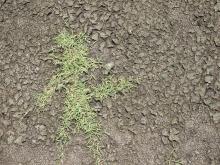
AS THE SEASON turned from summer to fall, I was reflecting again about Sojourners’ vocation, the focus of our mission and ministry.
Matthew 25:31-46 is my own conversion text, the scripture that brought me to Christ a long time ago out of the radical student movement. It’s also been a converting text for many others here at Sojourners over the years.
The 25th chapter of Matthew’s gospel has been foundational to Sojourners from the very beginning of the Sojourners community more than 40 years ago. But I am realizing that Matthew 25 is not only foundational for us, it is really our vocational text. In other words, it shapes not just what we believe and what we stand for, but also what we do as an organization—the issues we address, the campaigns we get involved in, the statements we sign, the coalitions we join, and much more.
In that sense, I’ve been thinking about Matthew 25 in relation to issues of organizational stewardship and sustainability. Autumn is always a busy season for me and for Sojourners. Faced with many invitations, requests, and opportunities to make a positive impact on a variety of issues, how do we decide where and how to focus our ministry, energy, staff, time, and gifts? How do we be good stewards of our calling? I think that Matthew 25:31-46 provides the answer. The key moment in the passage is when Jesus says:
I was hungry and you gave me food, I was thirsty and you gave me something to drink, I was a stranger and you welcomed me, I was naked and you gave me clothing, I was sick and you took care of me, I was in prison and you visited me ... Just as you did it to one of the least of these who are members of my family, you did it to me.
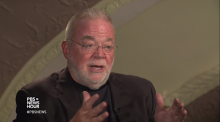
Pope Francis’ strident critique of “unbridled capitalism” has turned heads across the globe. Ahead of his upcoming visit to the United States, American politicians, religious leaders, and laypeople are eager to hear how Pope Francis thinks about economics.
Economics correspondent Paul Solman spoke with Jim Wallis and others in a segment for PBS Newshour about why the pope wants us to stop worshiping capitalism.
Jim Wallis explained how Pope Francis’ critique of capitalism matches God’s vision for the world, as well as the ministry and example of Jesus:
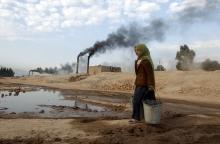
Supporters of the Islamic Declaration on Climate Change included the grand muftis (highest authorities in religious law) of Uganda and Lebanon and government representatives from Turkey and Morocco. The conference itself, the International Islamic Climate Change Symposium, was co-sponsored by Islamic Relief Worldwide, the Islamic Foundation for Ecology and Environmental Sciences, and GreenFaith.
The declaration comes at a moment ripe for climate change discussion, in the wake of President Obama’s announcement of a Clean Power Plan on Aug. 3. The plan requires states to reduce carbon emissions from coal power plants starting in 2017. It’s also a timely precursor to the upcoming United Nations Conference on Climate Change in Paris this December.
The declaration cites climate change research, followed by a detailed call to action. Among other things, it puts pressure on those attending the United Nations Conference on Climate Change to set clear goals, calls on wealthy and oil-producing nations to be leaders in curbing greenhouse gas emissions by 2050, and asks that all nations commit to 100 percent renewable energy or a zero emissions strategy.
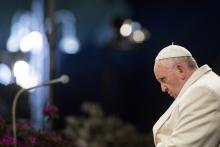
Someone has said that Pope Francis is really a Protestant. He is, if Protestant is defined as someone who protests. His recent encyclical Laudato si' is a protest against the often irresponsible industries as they pollute the environment.
Pope Francis especially protests the ways in which coal is burned in the production of electricity. He is right to protest. What comes out of the smoke stacks of coal-fed electric power plants is linked to 50,000 deaths a year, according to Physicians for Social Responsibility. Because children and the elderly among the poor are the most vulnerable, the pope, following his namesake, St. Francis, has a special concern for those that Jesus calls "the least of these."